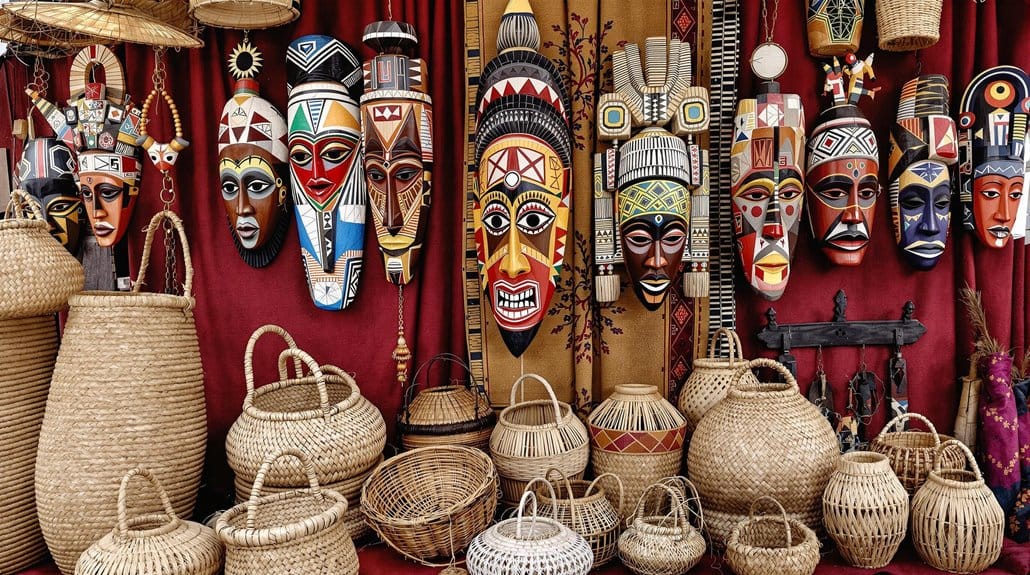When you explore African artisan markets, you encounter a treasure trove of one-of-a-kind souvenirs that reflect the continent's diverse cultures. Each handcrafted item, from intricate baskets to vibrant sculptures, carries its own story and significance. By choosing these unique pieces, you're not just acquiring decor; you're participating in a larger narrative of community and tradition. The impact of your purchase extends beyond aesthetics, influencing local economies and artisans' livelihoods. But what happens when you consider the deeper meanings behind these crafts? Let's examine the stories and values that make each piece truly special.
Key Takeaways
- Handcrafted baskets showcase cultural artistry and are functional for storage, supporting fair trade practices for local artisans.
- Vibrant African sculptures reflect rich cultural themes and are made from diverse materials, emphasizing unique artistic mastery under fair trade principles.
- Traditional textiles like kente cloth and mudcloth embody African history and narratives, crafted using age-old techniques with eco-friendly practices.
- Artisan jewelry and beads feature stunning craftsmanship and natural materials, connecting to deep cultural symbolism while promoting sustainability.
- Purchasing these unique items empowers artisan communities, supports economic stability, and preserves cultural heritage through fair trade practices.
Unique Handcrafted Baskets
Have you ever marveled at the beauty of a handcrafted basket? Each piece tells a story, woven with care by skilled artisans who pour their cultural heritage into every strand. These unique handcrafted African baskets aren't just functional; they're a celebration of tradition and artistry.
As you run your fingers over the vibrant patterns and intricate details, you'll notice the natural variations that make each basket truly one-of-a-kind.
Imagine using one of these baskets in your home, adding a splash of color while also providing practical storage solutions. Whether it's for organizing your belongings or as a decorative centerpiece, these baskets seamlessly blend utility with aesthetic appeal.
Plus, when you choose to purchase one, you're supporting fair trade practices that guarantee artisans receive fair wages. This connection to the craftsmen enhances your sense of belonging, knowing that your choice has a positive impact on their lives.
Vibrant African Sculptures
Artistry shines through in the vibrant African sculptures that grace homes and galleries worldwide. These handcrafted treasures reflect the rich cultural heritage and artistic mastery of their regions.
Each piece tells a story, inviting you to connect with the spirit of African art in a profound way.
When you explore these sculptures, you'll find:
- Diverse Materials: Crafted from wood, stone, and metal, showcasing techniques passed down through generations.
- Unique Designs: Expect variations in color and form, as each sculpture bears the unique mark of its artisan.
- Cultural Themes: Many sculptures depict spirituality, community, and daily life, offering a glimpse into the narratives that shape African societies.
- Fair Trade Practices: Many artisans create these works with fair trade principles, ensuring they receive just compensation for their skill and effort.
Bringing one of these vibrant sculptures into your home isn't just about decoration; it's about embracing a piece of history and culture.
Each sculpture serves as a reminder of the interconnectedness of community, artistry, and the stories that bind us all together.
Traditional Textiles and Fabrics
African artisans' traditional textiles and fabrics are a vibrant tapestry of culture and history, each piece telling a unique story of its community. When you explore the markets, your eyes are immediately drawn to the striking patterns and colors that embody the rich heritage of various African cultures.
Imagine wrapping yourself in kente cloth from Ghana, where each color symbolizes a different aspect of life, or adorning your home with mudcloth from Mali, steeped in the historical narratives of its makers.
These traditional textiles are more than just beautiful; they're crafted using time-honored techniques passed down through generations, ensuring that cultural identities remain alive.
Fabrics like shweshwe from South Africa showcase intricate designs, perfect for both clothing and decor, demonstrating their versatility. You'll also appreciate how local materials and dyes are used, reflecting a commitment to eco-friendly practices that support artisans and their families.
As you connect with these textiles, you're not only bringing home a piece of art but also a story—a connection to the vibrant communities that create them.
Each purchase supports sustainability and fosters a sense of belonging to a global tapestry of culture.
Artisan Jewelry and Beads
In the vibrant markets of Africa, artisan jewelry and beads beckon with their stunning craftsmanship and rich symbolism. Each piece tells a story, reflecting the unique cultural heritage and artistry of local artisans.
When you explore these markets, you'll discover a treasure trove of handmade creations that speak to the heart of community and identity.
Here are four reasons to embrace artisan jewelry:
- Craftsmanship: Each item is crafted using traditional techniques, showcasing the skills passed down through generations.
- Natural Materials: Many pieces feature vibrant colors and intricate patterns, often made from clay, wood, and sustainably sourced metals.
- Cultural Significance: Beads serve not only as adornments but also as symbols of identity and status, connecting you to a deeper cultural narrative.
- Sustainability: By choosing artisan jewelry, you support eco-friendly practices, as many items incorporate recycled glass and locally sourced gemstones.
Purchasing these unique pieces not only enhances your collection but also contributes to fair trade practices, improving artisans' livelihoods and preserving cultural artistry.
You'll find that wearing artisan jewelry is more than just a fashion statement—it's a way to belong to a global community.
Cultural Significance of Crafts
Crafts embody the rich cultural heritage and traditions of communities, with each piece offering a glimpse into the artisan's life and experiences.
When you explore African culture through handcrafted items, you'll discover stories woven into textiles and carved into sculptures. These creations often reflect techniques passed down through generations, preserving the artistry and cultural narratives of the maker's ancestors.
The materials artisans select—natural fibers, locally sourced woods—aren't just functional; they represent a deep connection to their environment and cultural practices.
Each item is infused with traditional symbols and motifs that denote community, spirituality, and identity, making your purchase a meaningful expression of cultural values.
Sustainable Fair Trade Practices
When you choose African artisan souvenirs, you're not just acquiring a unique piece of culture; you're supporting ethical sourcing and local artisans.
Each handcrafted item reflects a commitment to environmental sustainability, ensuring that artisans work in safe conditions and earn fair wages.
Your purchase empowers communities, preserving their heritage while promoting economic stability.
Ethical Sourcing Commitment
Ethical sourcing stands at the heart of African artisan souvenirs, ensuring that each handmade piece you purchase reflects a commitment to fair trade practices.
When you choose these unique creations, you're not just acquiring beautiful items; you're supporting a movement that empowers artisans across 15 African nations.
Here's how your choices matter:
- Fair Compensation: Each artisan receives fair wages, allowing them to improve their livelihoods.
- Quality Materials: Products are crafted using sustainable materials, preserving both the environment and cultural techniques.
- Transparency: You'll find clarity in sourcing and production, helping you understand the journey of your fair trade goods.
- Community Support: Your purchases contribute to the well-being of entire communities, fostering growth and resilience.
Supporting Local Artisans
Supporting local artisans through sustainable fair trade practices not only enriches your life with unique, handcrafted souvenirs but also plays an essential role in uplifting communities across Africa.
When you choose to shop at the vibrant African crafts market, you're making a conscious decision to support those who pour their heart and soul into their work. Fair trade guarantees that artisans receive fair wages and work in safe conditions, empowering them economically.
By purchasing these one-of-a-kind pieces, you help preserve cultural heritage and traditional crafting techniques that have been passed down through generations. Each item carries a story, connecting you to the artisan and their community.
Membership in the Fair Trade Federation guarantees ethical sourcing, fostering trust between you and the makers of these beautiful crafts.
Your support strengthens community bonds and fuels local economies, creating a positive ripple effect in the regions where these artisans thrive.
Environmental Sustainability Focus
Crafting souvenirs with care, many African artisans embrace sustainable fair trade practices that not only uplift their communities but also protect the environment.
By choosing products produced in Africa, you're joining a movement that values both people and the planet. Here's how supporting these artisans makes a difference:
- Fair Wages: Artisans receive just compensation for their work, allowing them to thrive and support their families.
- Natural Materials: Many crafts are made using sustainable materials, reducing environmental impact and preserving local ecosystems.
- Transparent Sourcing: You can trace the origins of your purchases, fostering responsible consumption and a deeper connection to the artisans.
- Cultural Heritage: Supporting these markets helps preserve traditional crafting techniques, ensuring cultural stories and skills are passed down through generations.
When you shop sustainably, you contribute to a circular economy where profits are reinvested into local communities.
You're not just buying a souvenir; you're participating in a meaningful exchange that champions environmental sustainability and community empowerment.
Choose wisely, and let your purchases tell a story that matters.
Supporting Local Artisans
When you choose to support local artisans, you're not just buying a souvenir; you're empowering entire communities.
Each handcrafted piece embodies rich cultural heritage and traditional skills, ensuring these practices thrive for future generations.
Empowering Artisan Communities
Often, the vibrant tapestry of local artisan communities is woven with stories of resilience and creativity. When you support these talented individuals, you're not just buying a unique piece for your coffee table; you're investing in lives and cultures.
Here's how your choices empower artisan communities:
- Fair Wages: Each purchase guarantees artisans receive fair compensation, enabling them to sustain their livelihoods.
- Cultural Heritage: By showcasing their tribal African craftsmanship, artisans preserve and promote the unique traditions of their regions.
- Economic Empowerment: Your support helps artisan families invest in education and healthcare, improving their living conditions.
- Community Building: Engaging with artisan markets fosters collaboration, allowing craftspeople to share knowledge and sustain traditional techniques for generations to come.
Shopping online for African artisan goods or exploring local markets not only gives you beautiful gift ideas but also strengthens these communities.
When you choose to buy handmade treasures, you become part of a larger narrative—one that cherishes culture and nurtures relationships. Embrace the stories behind the art, and let your purchases echo with purpose.
Fair Trade Practices
Fair Trade practices shine a light on the vibrant world of local artisans, guaranteeing that their skills are recognized and rewarded. By supporting these initiatives, you not only indulge in unique handmade goods but also contribute to the economic stability of communities across Africa. Every purchase you make helps artisans receive fair wages and work under safe conditions, fostering empowerment and cultural preservation.
| Fair Trade Benefits | Impact on Communities |
|---|---|
| Guarantees fair wages | Promotes economic stability |
| Supports ethical sourcing | Empowers local artisans |
| Fosters community development | Combats poverty & promotes social justice |
When you choose Fair Trade products, you're embracing transparency in sourcing and production processes. You can feel good knowing where your items come from and how they are made. Each handcrafted piece you take home not only tells a story but also weaves you into the fabric of local culture. By participating in Fair Trade, you help sustain artisan communities, making you an essential part of a movement that champions both creativity and justice.
Cultural Heritage Preservation
Embracing the beauty of African artisan souvenirs allows you to play an essential role in preserving cultural heritage. When you support local artisans, you're not just buying a unique piece; you're engaging with the rich cultural narratives that define their communities.
Here's how your choice matters:
- Maintain Traditional Techniques: Each handcrafted item showcases artistry unique to its maker, guaranteeing these traditions endure.
- Fair Trade Impact: Supporting fair trade practices guarantees artisans receive fair wages, promoting economic stability and sustainability in their craft.
- Empower Communities: Your purchase empowers artisans to pass down their skills to future generations, fostering community development.
- Promote Diversity: By choosing one-of-a-kind souvenirs, you celebrate the diversity of African heritage, enriching your life with stories and craftsmanship.
Every piece you bring home is an affirmation of the resilience and creativity of local artisans. It connects you to their cultural narratives, making your souvenir more than just an object—it's a bridge to the heart of Africa.
Frequently Asked Questions
How Can I Identify Authentic African Artisan Products?
To identify authentic African artisan products, you'll want to look closely at the craftsmanship.
Notice the artisan techniques used—like hand-weaving, carving, or painting. Each method tells a story and reflects local traditions.
Check for imperfections, too; they often signify handmade authenticity.
Engage with the artisans if possible; their passion and knowledge can deepen your appreciation.
Are There Specific Regions Known for Certain Craft Styles?
Yes, certain regions are renowned for unique craft styles, each carrying deep cultural significance.
For instance, the Maasai in Kenya are famous for their vibrant beadwork, symbolizing community and identity.
In Nigeria, the Yoruba people create intricate ceramics, reflecting their rich history.
As you explore these regions, you'll find that each craft tells a story, connecting you to the people and their traditions, allowing you to feel a sense of belonging to a larger narrative.
What Is the Best Way to Care for These Souvenirs?
To guarantee your souvenirs last, focus on souvenir preservation.
Keep delicate items away from direct sunlight to prevent fading. Regularly dust them with a soft cloth, and avoid harsh chemicals that could damage their finish.
For textiles, gentle hand washing or dry cleaning is best. Store them in a cool, dry place, away from moisture.
Can I Visit Artisan Markets Virtually?
Did you know that over 70% of people prefer virtual experiences when exploring new cultures?
You can absolutely visit artisan markets virtually! Many platforms offer immersive virtual tours that transport you to vibrant stalls filled with handcrafted treasures.
You'll interact with local artisans, hear their stories, and feel the energy of the market.
It's a unique way to connect with distant cultures and discover the beauty of their craftsmanship—all from the comfort of home.
How Do I Ensure My Purchase Supports Local Communities?
To guarantee your purchase supports local communities, focus on ethical sourcing.
Research brands that prioritize fair wages and sustainable practices. Ask questions about where the products come from and who makes them.
When you shop, look for certifications that confirm a commitment to community welfare.
Conclusion
As you stroll through the vibrant markets, clutching your one-of-a-kind basket, it's ironic how a simple purchase can weave together the threads of cultures, histories, and dreams. Each handcrafted item you choose isn't just a souvenir; it's a story, a heartbeat from the artisans who poured their soul into it. By supporting these crafts, you're not just decorating your home—you're becoming part of a global tapestry that celebrates creativity, community, and the essence of Africa.








